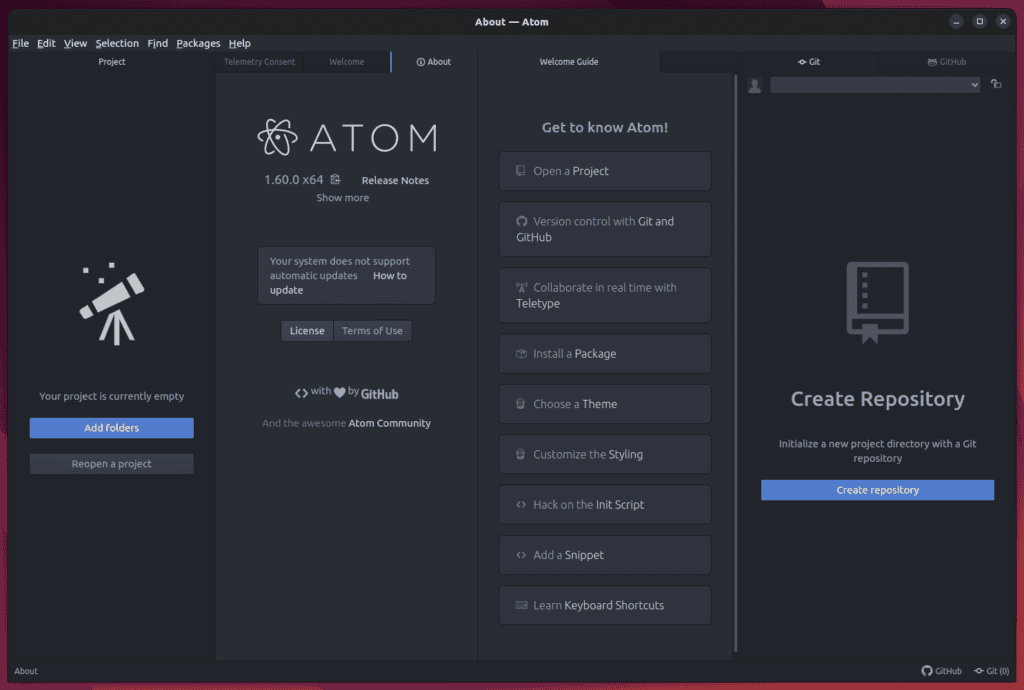This is one of the sadder news stories we cover because it is about the purposeful termination of the lifecycle of open source software, beloved by many developers worldwide, in favor of Microsoft Visual Studio Code.
Recently, Microsoft-owned GitHub announced it will sunset its popular Atom “hackable text editor” late this year. To be more precise, the date is December 15, 2022, when all GitHub Atom’s repositories and all other repositories remaining in the Atom organization will be archived.
Atom is a free, cross-platform, open-source text and source code editor developed by GitHub that integrates tightly with the platform. Its developers call it a “hackable text editor for the 21st Century.” Atom allows developers to completely customize the editor’s appearance, feel, and requirements in order to speed up their workflows.

Back in 2014, Atom was developed and released by GitHub. But let’s recall some history first. When Microsoft acquired GitHub in June 2018, Nat Friedman, the CEO at the time, reassured the GitHub community that Atom was still alive and well.
Atom is a fantastic editor with a healthy community, adoring fans, excellent design, and a promising foray into real-time collaboration. At Microsoft, we already use every editor from Atom to VS Code to Sublime to Vim, and we want developers to use any editor they prefer with GitHub. So we will continue to develop and support both Atom and VS Code going forward.
Nat Friedman
However, four years later, everything has radically changed.
While that goal of growing the software creator community remains, we’ve decided to retire Atom in order to further our commitment to bringing fast and reliable software development to the cloud via Microsoft Visual Studio Code and GitHub Codespaces.
Microsft’s GitHub Announce
To clarify, GitHub Codespaces is a cloud-hosted development environment that can be tightly integrated with Microsoft’s Visual Studio Code.
So the preceding statements put everything out in a clean version with no additional embellishment. The purpose is crystal clear. Microsoft intends to push all existing users of Atom to their editor, Visual Studio Code.
Suppose you’re asking, “So what now?” here’s what happens next. The Atom is still available for download and usage from the project website. However, users will receive in-app warnings that the app is being phased away over the following six months.
On December 15, 2022, GitHub’s Atom-related repositories will be archived, and the official website will most likely be retained for historical purposes only, with no software downloads available.
Well, we realize that the owner, in this case, Microsoft, is free to dispose of its software. We also understand that this decision is motivated by financial and strategic concerns.
However, the sad thing is that, once again, all open-source software advocates are witnessing what happens to a piece of open-source software when a private company acquires it. The promises, in the beginning, are that it will be developed and maintained, only to come to an inevitable end.
To summarize, Microsoft has taken many steps to “appease” open-source supporters in recent years. But, following this action, is the slogan “Microsoft loves open source” still carry the same weight? We’d love to hear your thoughts in the comments section below.

My level of belief in the statement “Microsoft loves open source” is not likely to be impacted much by this. First, if Atom is genuinely open-source, then (hopefully) other developers should be able to fork it and continue its development if they wish. Second, Microsoft has put the source for VS Code under an open-source license. (Use VSCodium if you want an open-source build of it.) Third, they are giving adequate notice to let everyone know before they close the project down. In sum, I see this as a business move to focus on efficiencies, not a move against the open-source community.
An additional point: my belief in the statement is/was still incomplete as of this announcement. While Microsoft has clearly been cooperative rather than combative against open source in recent years, I still harbor some doubt. This move is likely not going to affect that level of doubt. They were antagonistic toward open-source for many years and it takes time to build trust. They do seem to be taking good steps in the right direction overall.
https://wikiless.org/wiki/Embrace,_extend,_and_extinguish
Nat Friedman has always, always, always been a liar. From the early days when he and his partner Miguel sabotaged the Linux desktop, to their sabotage of open source groupware via the Hula vaporware project, to their sabotage of Java and Python by introducing Mono … Friedman has always been a lying, cheating, stealing, enemy of open source.